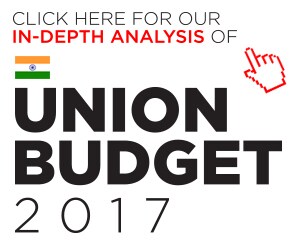
Analysts approve Jaitley's fiscally prudent budget
While they hailed the finance minister's strategy of taking measured steps to boost growth without being spendthrift, they hoped for a road map towards solving India's bad loans problem

Image: Amit Dave / Reuters
Analysts tracking the Indian economy have given a thumbs-up to the Union Budget presented by Finance Minister Arun Jaitley on February 1, calling it high on intent to remain fiscally prudent and provide a moderate boost to economic growth, even as it stayed away from any big-bang announcements.
A post-budget analysis put out by PricewaterhouseCoopers (PwC) set the context in which Jaitley presented the 2017 budget well. “Not only the global headwinds of an unprecedented nature, but also the huge uncertainty regarding where the current year will finally end in terms of GDP growth and related tax collections as well as the mid-year GST (Goods and Services Tax) roll out and its attendant uncertainties, created complexities in estimated tax revenues for the coming year,” the PwC report said. “In the midst of having to balance fiscal prudence, throw in a good measure of populism to blunt the pain of demonetisation and to spur both private and government investment to get back to double-digit growth in the medium-term was not going to be easy.”
In the aforementioned context, Jaitley kept things “simple and tight” as he went about articulating the government’s financial plan for the coming fiscal, according to a research report by Kotak Institutional Equities.
The Street lauded the finance minister for sticking to a strict fiscal deficit target (3.2 percent in 2017-18, and 3 percent in 2018-19) by ensuring that he doesn’t go overboard in announcing government spending projects, which can help win votes in an election season but adversely impact the country’s financial situation.
The Union Budget 2017 has performed a balancing act. With an eye to reducing deficit and simultaneously improving growth prospects, the Budget refrained from stretching its fiscal coffers to give a steroidal push to the economy,” a post-budget analysis report by ratings agency Crisil said. “Yet, sectors like transport and affordable housing received a shot in the arm, which in turn, is expected to push demand in sectors such as cement and steel, generating positive multiplier effects in employment and incomes. This, to an extent, will help alleviate some stress in rural areas which were hit hardest by the demonetisation drive.”
The Crisil report also noted that a five percentage points reduction in individual income tax rates in the lowest income slab of Rs 2.5 lakh-Rs 5 lakh per annum would also help raise the purchasing power of Indians, especially those residing in rural areas. “Nearly 20 million people who currently declare income in this bracket will benefit from the change,” the ratings agency said, and added that the government’s fiscal deficit target for the next fiscal looked manageable.
However, failure to achieve the target of revenue generation through disinvestment of the government’s holding in public sector enterprises and potentially higher revenue expenditure in the future could pose a risk to the fiscal deficit target outlined by Jaitley, says a report by Ambit Capital. “Despite this, we expect the RBI (Reserve Bank of India) to highlight the high probability of the RBI undershooting its inflation target and hence administer a 25 basis points rate cut next week at its monetary policy review.”
While staying away from announcing any further large-scale reforms in the Budget, which took place after the demonetisation drive and prior to the expected implementation of GST on July 1, the government did signal its intent of making India a more investor-friendly place, while ensuring higher tax collection by turning the spotlight on evaders. Prime Minister Narendra Modi’s tool of choice to execute this complex task is digitalisation.
“Demonetisation has also brought the digital agenda to the fore like never before, and having painstakingly laid down in the speech the low rate of tax compliance in the country, the government recognises that in order to make quantum leaps in the levels of compliance and overall tax revenues, it is only the digital payment infrastructure and GST that can make it happen,” the PwC report said.
But the Budget contained a few negative surprises for those tracking it as well. It left the corporate tax rate for larger companies unchanged, “which is surprising since several exemptions for companies will cease to exist starting from April 1 as part of the changes to the Income Tax Act in the previous budget,” the Kotak report observed.
The Ambit report stated that increased focus on tax compliance was likely to shrink the non-tax paying informal sector in India, “which would entail a degree of demand destruction as the informal sector accounts for around 40 percent of India’s GDP and provides employment close to 75 percent of the labour force.”
Both Ambit and Crisil noted that one obvious omission in Jaitley’s speech was the articulation of a road map to tackle the asset quality challenges faced by the Indian banking system.
“Even if the government’s hands were tied with respect to funding recapitalisation, the announcement of a bad bank or banking sector reforms could have helped in resolving the situation at hand,” the Ambit report said.
Ambit was particularly pleased with the continuation of the government’s intention to crack down on black money with provisions such as disallowing cash transactions over Rs 3 lakh in value. Jaitley also said the government will introduce a new law to confiscate the domestic assets of economic offenders who flee the country until they submit to the jurisdiction of the appropriate legal forum. “We believe such a law would give teeth to the Bankruptcy Code that was approved by Parliament last year,” the Ambit report said.





